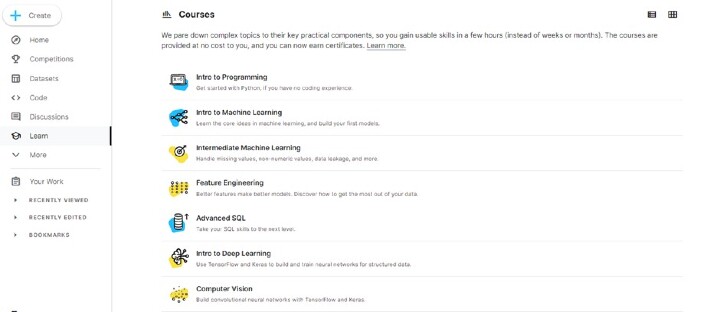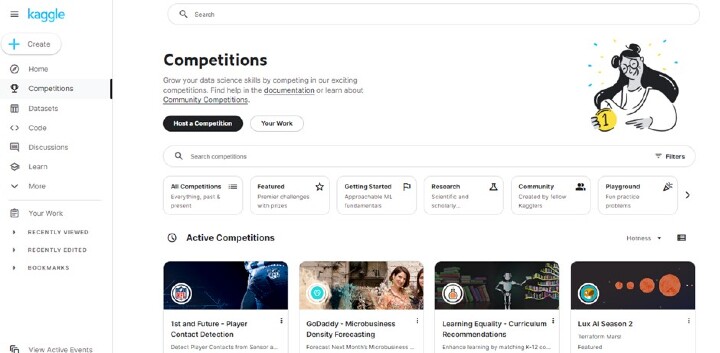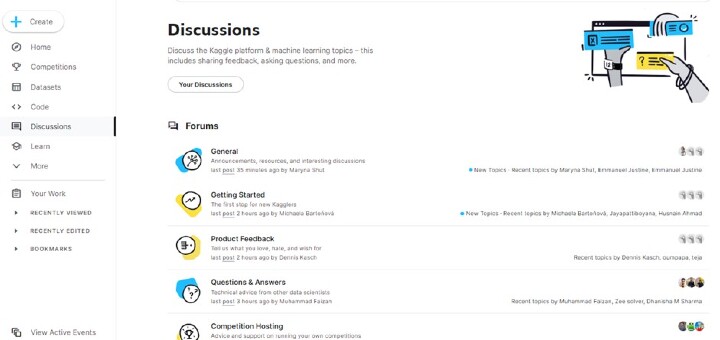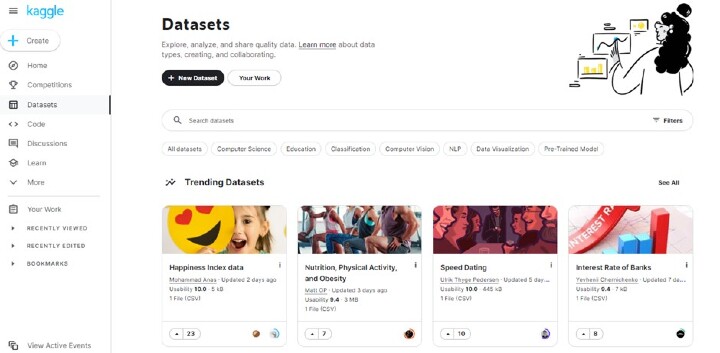
 Data Structure
Data Structure Networking
Networking RDBMS
RDBMS Operating System
Operating System Java
Java MS Excel
MS Excel iOS
iOS HTML
HTML CSS
CSS Android
Android Python
Python C Programming
C Programming C++
C++ C#
C# MongoDB
MongoDB MySQL
MySQL Javascript
Javascript PHP
PHP
- Selected Reading
- UPSC IAS Exams Notes
- Developer's Best Practices
- Questions and Answers
- Effective Resume Writing
- HR Interview Questions
- Computer Glossary
- Who is Who
How Should a Machine Learning Beginner Get Started on Kaggle?
Kaggle is a social hub for data science and machine learning advocates where enthusiasts learn, explore, share, and collaborate to enhance their skills. Kaggle is like a playground for data, providing features like courses, competitions, discussions, and more. It provides users with a Jupyter notebook-like environment, saving time on setup and getting to work quickly.
Kaggle is a great platform to practice and improve your skills. However, if you're new to Kaggle, the platform can be quite overwhelming to navigate. In this article, you'll get a quick overview of how ML engineers can make the most of Kaggle. We'll guide you through the process, from setting up your account to exploring datasets to competing in challenges and collaborating with other data scientists.
Now, before getting started, it is highly recommended to create a professional Kaggle profile, as it can help you get potential opportunities and make your profile credible. Let's see how different features on Kaggle can help you excel as a machine learning engineer ?
Kaggle Courses
As an MLE, one has to be typically skilled in programming languages like Python, as well as in ML libraries and frameworks such as TensorFlow, PyTorch, and Scikit-Learn. Kaggle Learn provides short and concise courses, covering topics including Python, ML libraries, SQL, and data analysis and visualization. These are completely free of cost, while providing you an opportunity to earn certificates as well.

Kaggle Competitions
Kaggle's community competitions offer a great chance to sharpen your skills by solving problems based on real-world datasets. This helps you gain practical experience while networking and collaborating with other like-minded enthusiasts. It is important to identify and choose the competition that best matches your set of skills; one can do this by looking at the competition details. The good part is that you can win swag and incentives along the way. But always keep in mind that your prime focus should be on solving the problems first. Each competition has its own set of rules and guidelines to follow to ensure a fair environment, so make sure to review those as well.

Kaggle Discussions
One of the useful features on Kaggle is their discussion section. Data science and ML enthusiasts gather here to discuss different topics. You can ask for help, receive assistance from others, and gain actionable insights from professionals on how to improve your models.

Choosing to participate in conversations is a wise move, as this will help build your credibility online.
Kaggle Kernel and Notebooks
Kaggle's most potent feature, aside from learning resources and competitions, is the ability to create notebooks on the go. Kaggle notebooks are built over the Jupyter environment, which support programming languages like R and Python and come with pre-installed machine learning packages. These notebooks can be easily integrated with the datasets already available on the platform, allowing users to analyze huge datasets without having to worry about downloading them.
Users can also collaborate via notebooks (e.g., working with a teammate on a Kaggle competition) for different projects. You can also choose to share your notebook with others and explore the notebooks of fellow practitioners as well. To open yourself up to new opportunities, you can post the project links on your professional portfolio.

You may browse the trending notebooks on the Code tab or even conduct a search for notebooks on a particular topic, which is a terrific way to find inspiration for your own portfolio projects. GPUs are also available to train deep neural networks.
Kaggle Datasets
Kaggle datasets are one of the most popular resources when it comes to finding freely available, publicly accessible datasets. Data science and ML enthusiasts can access and use these datasets in their own projects. A vast array of datasets from sources including social, financial, entertainment, cultural, and economic data are available on Kaggle. It is possible to develop models directly on the platform by integrating these datasets with Kaggle notebooks.
Users can also contribute their own datasets, which makes the community even more robust and powerful.

Conclusion
In conclusion, Kaggle provides an amazing opportunity for learners who want to practice and hone their machine learning skills. One can start taking part in competitions and getting involved with the platform by learning, taking part in competitions, and exploring datasets, which will help you gain practical experience as a beginner.
For ML engineers, Kaggle is a wonderful place to network with other data scientists, learn from the best, receive feedback and validation, and collaborate with them to build their portfolios and get recognition for the work they do. So, get going right away and start building your ML portfolio on Kaggle!

